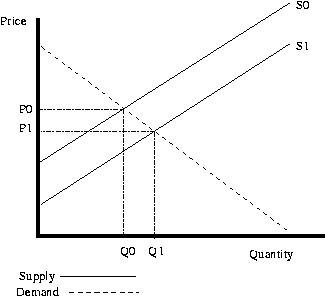Induced demand
|
|
Induced demand is the phenomenon that after supply increases, more of a good is consumed. This is entirely consistent with the economic theory of supply and demand, however has become important in the debate over the expansion of transportation systems.
In the image, when supply is expanded from S0 to S1, the price (e.g. travel time) drops from P0 to P1, and quantity consumed (e.g. vehicle kilometers traveled) increases from Q0 to Q1. The amount depends on the elasticity of demand.
Research indicates that the elasticity of traffic demand with respect to roadway expansion is between 0 and 1, indicating that a 1% increase in roadway expansion will generate less than a 1% increase in traffic demand. However it is greater than 0%, so new roadway construction will result in some additional traffic that would not have occurred but for the new capacity.
An interesting effect is that when road capacity is reduced, the total traffic is reduced. This has been demonstrated in a number of studies associated with bridge closings (to be repaired) or major roads rehabilitation projects. These studies have demonstrated that the total traffic, considering the road or bridge closed and alternative roads where this traffic is diverted, is lower that in the previous situation. In fact, this is an argument to convert roads previously open to vehicle traffic into pedestrian areas, with a positive impact on the environment and the congestion, as the example of the central area of Florence, Italy.
Many environmentalists believe that by encouraging development many kilometres away from jobs and services, freeways contribute to increasing traffic flows, and thus the freeway ends up just as congested as previously, thus requiring the freeway to be widened (again). The evidence is that the congestion will not be as bad as prior to the new construction, but that traffic congestion will not simply disappear.
Propononents of road construction and economists will note that the fact that there is additional travel indicates that the roadway construction or expansion is adding value to those users. See consumer surplus.
Some roadway advocates note that because of underlying factors (e.g. population and income growth), traffic will grow anyway, whether or not freeways are expanded. And thus, without widening, traffic would be even worse than it is, contributing even more pollution. Environmentalists reply that the new induced traffic will generate more pollution and exacerbate the greenhouse effect more than leaving the road unbuilt.

